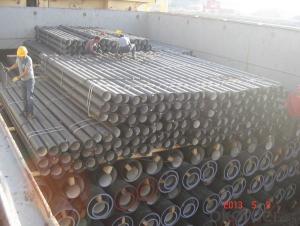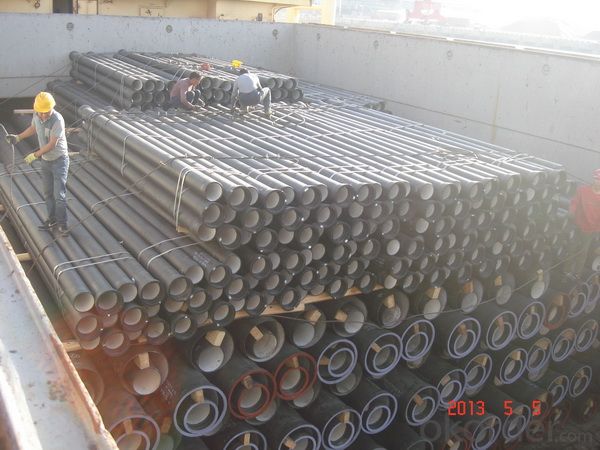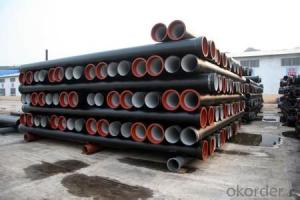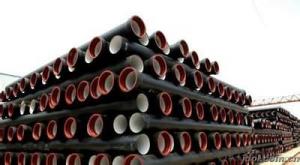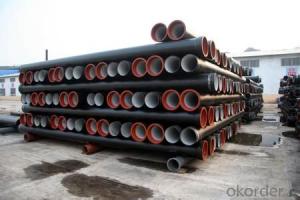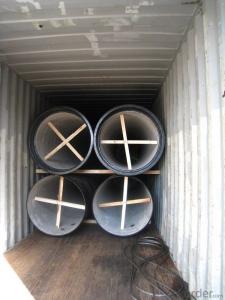DUCTILE IRON PIPE DN125 c class
- Loading Port:
- Tianjin
- Payment Terms:
- TT OR LC
- Min Order Qty:
- -
- Supply Capability:
- 30000Tons m/month
OKorder Service Pledge
OKorder Financial Service
You Might Also Like
CNBM ductile iron pipe ranges from DN80-DN1600mm (T-Type, Class K9), effective length 6m, comply with ISO2531 Standard
Company Profile
CNBM International Corporation is the leading production base and renowned supplier of Ductile Iron Water Pipe systems of both potable and waste water in China. We are constantly looking to develop high quality products to ensure the longest service life and wonderful performance.
CNBM Pipelines regard quality as the essential factor leading to successful business. Every pipe is tested in accordance with BS EN545 (water application) or BS EN598 (sewer application). CNBM Pipelines products comply with and are tested according to the relevant European and International Standards. Our pipes are manufactured under the quality management system BS EN ISO 9001. After years of efforts, CNBM Pipelines has built up great reputation in terms of quality and service among customers worldwide
Product Introduction
CNBM ductile iron pipe ranges from DN80-DN1600mm (Tyton, T-Type, Class K7/K8/K9), effective length: 6m, complying with BS EN545/EN598/ISO2531/BS4772.
Specification& Payment terms
Internal lining: Pipes shall have an internal cement mortar lining in acc with ISO4179.
External coating: Pipes shall be externally coated with metallic zinc spray plus a further layer of resin painting to ISO8179.
Gasket: 100% SBR/NBR/EPDM gasket in accordance with ISO4633.
Packing: Pipes from DN100 to DN300 be bundled with steel belts, the others are in bulk.
Payment term: By 30% T/T advance payment + 70% Irrevocable L/C at sight.
Packing: In bulk vessel or in container.
- Q: Can ductile iron pipes be used for underground hydrocarbon pipelines?
- Yes, ductile iron pipes can be used for underground hydrocarbon pipelines. Ductile iron pipes are known for their strength, durability, and resistance to corrosion, making them suitable for transporting hydrocarbons underground. However, it is important to consider factors like the specific hydrocarbon being transported, pressure requirements, and regulatory standards before selecting the appropriate material for the pipeline.
- Q: Steel plastic pipe, ductile iron pipe, steel pipe difference
- The steel plastic pipe, the outer layer is made of steel, the inner cover of organic material, not easy to transport corrosive medium, suitable for delivery of utilities, tap water and toxic corrosive medium, not suitable for high temperature medium, pipe price is high, very difficult to install and manufacturers warranty period is generally 10 years.
- Q: How are ductile iron pipes protected against internal corrosion?
- Ductile iron pipes are protected against internal corrosion through a combination of various preventive measures. One of the primary methods is the application of a protective coating on the inner surface of the pipe. This coating acts as a barrier between the pipe and the transported fluid, preventing direct contact and minimizing the chances of corrosion. Another common method used is the application of a cement mortar lining. This lining further enhances the protective barrier, reducing the likelihood of corrosion even in aggressive environments. The cement mortar also provides a smooth surface, reducing friction and improving the flow of water or other fluids through the pipe. In addition to coatings and linings, ductile iron pipes are often designed with corrosion-resistant alloys or additives. These alloys, such as zinc or epoxy, are added during the manufacturing process and provide an extra layer of protection against internal corrosion. They act as sacrificial anodes, corroding over time to protect the underlying iron from degradation. Regular maintenance and inspection are also crucial in protecting ductile iron pipes against internal corrosion. Monitoring the condition of the protective coatings, identifying any signs of degradation or damage, and promptly addressing any issues are essential to ensure the long-term integrity of the pipes. Overall, a combination of protective coatings, cement mortar linings, corrosion-resistant alloys, and regular maintenance efforts work together to effectively protect ductile iron pipes against internal corrosion, extending their lifespan and ensuring the safe transportation of fluids.
- Q: Can ductile iron pipes be used for slurry transportation?
- Yes, ductile iron pipes can be used for slurry transportation. Ductile iron pipes are known for their high strength and durability, making them suitable for various applications including slurry transportation. Slurry is a mixture of solid particles and a liquid, which can be abrasive and corrosive. Ductile iron pipes have excellent resistance to abrasion, corrosion, and erosion, making them capable of handling the challenges posed by slurry transportation. Additionally, ductile iron pipes offer a smooth inner surface, reducing friction and improving the flow of slurry. Therefore, ductile iron pipes are a reliable choice for slurry transportation systems in industries such as mining, wastewater treatment, and oil and gas.
- Q: How do ductile iron pipes handle ground movement or settlement?
- Ductile iron pipes are well-suited to handle ground movement or settlement due to their inherent flexibility and durability. The ductile nature of the material allows the pipes to withstand moderate ground movement without cracking or breaking, while their strength ensures they can resist the pressure exerted by settling soil. Additionally, the joints of ductile iron pipes are designed to accommodate slight movements and provide a flexible connection. Overall, ductile iron pipes are a reliable choice for underground infrastructure, offering long-term performance even in areas prone to ground movement or settlement.
- Q: Are ductile iron pipes resistant to abrasion or wear?
- Yes, ductile iron pipes are highly resistant to abrasion or wear due to their inherent strength and durability.
- Q: Are ductile iron pipes suitable for use in cooling water systems?
- Yes, ductile iron pipes are suitable for use in cooling water systems. They offer excellent strength, durability, and corrosion resistance, making them ideal for transporting water at varying temperatures. Additionally, their flexibility allows them to withstand pressure and temperature changes, ensuring long-lasting and reliable performance in cooling water applications.
- Q: Are ductile iron pipes suitable for wastewater treatment plants?
- Yes, ductile iron pipes are suitable for wastewater treatment plants. Ductile iron pipes are known for their durability, strength, and resistance to corrosion, making them ideal for handling the harsh and corrosive environment found in wastewater treatment plants. Additionally, they have a smooth internal surface, reducing the risk of clogging and facilitating the efficient flow of wastewater.
- Q: Can ductile iron pipe be used for agricultural irrigation systems?
- Ductile iron pipe is a viable option for agricultural irrigation systems. This type of pipe is renowned for its robustness, longevity, and ability to resist corrosion, which renders it suitable for a wide range of uses, including agricultural irrigation. It possesses the capacity to endure high pressure, guaranteeing a dependable and enduring water transportation solution for irrigation systems. Moreover, ductile iron pipe is impervious to the chemicals typically present in water sources used for irrigation, ensuring the pipe remains intact and impeding any deterioration over time. Its pliability facilitates effortless installation and maintenance, positioning it as a pragmatic choice for agricultural irrigation systems.
- Q: Are ductile iron pipes resistant to environmental stress cracking?
- Indeed, environmental stress cracking is not a concern for ductile iron pipes. Ductile iron, a form of cast iron that has been infused with small amounts of magnesium for enhanced strength and ductility, possesses this advantageous quality. Consequently, these pipes exhibit exceptional resistance to cracking and harm caused by environmental stress factors like temperature fluctuations, soil shifting, and corrosive elements present in the surrounding environment. Moreover, the inherent robustness and adaptability of ductile iron enable it to endure substantial external pressure and stress without succumbing to cracking or failure. Ultimately, ductile iron pipes are a dependable and long-lasting option for various purposes, such as the transportation of water and wastewater, thanks to their ability to withstand environmental stress cracking.
Send your message to us
DUCTILE IRON PIPE DN125 c class
- Loading Port:
- Tianjin
- Payment Terms:
- TT OR LC
- Min Order Qty:
- -
- Supply Capability:
- 30000Tons m/month
OKorder Service Pledge
OKorder Financial Service
Similar products
Hot products
Hot Searches
Related keywords
